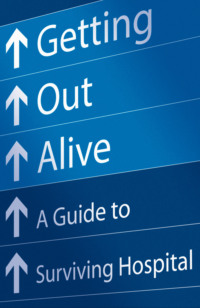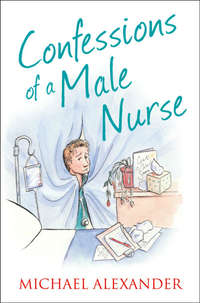
Полная версия
Confessions of a Male Nurse
‘Well, start acting like one,’ she added, her voice rising up an octave. ‘You can’t have someone holding your hand all the time. Take some initiative.’
I left the treatment room in a hurry and approached my patient.
Here I was standing at the patient’s bedside, with a syringe full of antibiotic that I’d never given before. Policy stated that I needed three months’ supervision before I could give these medicines on my own, and I was just nearing the end of my first month.
My mind was chaos turning over silly thoughts, crazy thoughts, even suspicious thoughts. Was Sharon trying to set me up to fail? What if something went wrong? I wasn’t even aware of all that could go wrong. If something did happen, no one would back me. Sharon would deny everything. What could I do? I knew what I should do . . . but I couldn’t risk facing the wrath of Sharon.
I slowly opened the intravenous valve and began to insert the syringe. In my nervousness I fumbled the syringe and it fell on to the bed. Was it still okay to use? I didn’t know, but Sharon would kill me if she saw me drawing up another antibiotic. I inserted the syringe and gave the antibiotic, because it was easier to do this than create a scene. I watched the patient’s chest to monitor her breathing. I felt her pulse . . . did it skip a beat? No, I was imagining things.
I waited anxiously those first few minutes, silently praying that nothing went wrong. Thank goodness my patient didn’t know how nervous I was, but even more importantly, thank goodness she didn’t have a clue that I wasn’t supposed to be doing this yet, even if my charge nurse had ordered me to. After five minutes, I figured that if anything was going to happen, it already would have. The one thing that even new nurses know is that with intravenous medicine when something goes wrong, it tends to happen pretty instantaneously.
I’d got away with it, this time, but would I always be so fortunate? One month in and life as a male nurse was already proving to be a minefield.
The scapegoat
The words looked all the same. The handwriting was horrendous: this could only be the writing of a doctor.
‘Can you make this out?’ I asked fellow nurse Jen, handing her the medical notes.
‘You’re hopeless,’ she responded in a tone of voice that seemed only half-joking. ‘You need to take some initiative. There won’t always be someone around to cover for you.’
Jen was yet to help me even once, and I would never ask her for help if there was anyone else around to ask.
‘I’m not asking for much,’ I replied, ’just some help interpreting the writing.’
As Jen tried to decipher the notes, I could see a frown forming. She was having as much trouble as I had been.
‘It says colonoscopy. You do know what that is, don’t you?’ she asked, with more than a hint of condescension in her voice.
‘If it’s the long, flexible tubey thing, with a bright light that goes a foot or two up your butt, then I guess I do.’
I was just as surprised as Jen that those words had come out of my mouth. I was just a graduate, while Jen had at least 20 years’ nursing experience behind her.
As I took the notes back, I avoided Jen’s gaze, worried that I had gone too far.
I took another look at the writing. I wasn’t 100 per cent convinced that it said colonoscopy. I knew she’d be pissed off if I asked her again, but I had to be certain.
‘Are you sure about that, Jen?’ I asked, increasingly regretting my earlier cheeky remark.
‘I’ve been doing this job since before you were born,’ she replied. I could see the veins begin to stand out on her forehead as she tried to control her anger. ‘You need to listen to your betters, or you’re going to mess up really bad one day.’
Now that I felt so positively reassured, I went ahead and got the patient ready for her colonoscopy.
‘Are you sure I need to drink all this?’ Mrs Knight asked me, after I had prepared the medicine for her to drink. At 79 years of age, Mrs Knight was quite a surprisingly sprightly little lady – a dedicated member of the local women’s walking club. Unfortunately she was having some women’s problems and had needed to be checked out.
‘I’m quite confident,’ I replied – trying not to put too much emphasis on the ‘quite’.
But Mrs Knight was still unsure about drinking two litres of salty water, and her hesitation was making me doubt my instructions as well.
After I poured the first glass, I stayed to watch as Mrs Knight took a mouthful of liquid.
‘Urrrgh.’
She almost choked. When her coughing fit passed, she looked me straight in the eye: ‘I can’t drink that stuff; there has to be another way. Besides, why do they want me to have an empty bowel? It’s not my bowel that’s causing the problem.’
She had a point and as I couldn’t come up with any answer other than the nurse in charge told me to, I thought I had better check again.
‘Mrs Knight’s refusing to take the drink,’ I began to explain to a very angry looking Jen, my voice tapering to a near whisper. ‘She doesn’t seem to think she needs it.’
Jen looked ready to hit someone. I held Mrs Knight’s medical file in front of me like a shield. She grabbed the file and looked at the notes again.
I didn’t see the look of shock that must have crossed her face, but I couldn’t miss her outburst.
‘You bloody idiot,’ she yelled at me. ‘What have you done? How much did you make her drink?’
Oh shit, what was wrong? All I’d done was what she’d told me to do.
‘Not much, not much at all, not even half a glass,’ I stammered. ‘I was only doing what you instructed.’
Obviously this was my screw-up; Jen certainly wasn’t going to take any of the blame.
‘I said colposcopy. You don’t know what a colposcopy is, do you?’
Thankfully, Mrs Knight didn’t drink her two litres of bowel-cleaning liquid and she was sent for her colposcopy, which was a look up the front side, not the back.
I kept silent – embarrassed and fuming at the same time. Jen had definitely said colonoscopy, but it was my word against hers, a new grad against an old hand. I would not win this argument.
Every ward needs to have senior, veteran staff members around that inexperienced people like me can turn to. I knew that Jen was a good nurse and could normally be relied upon to make the right decision, but sometimes impatience, being too busy, or even not liking a colleague can cloud a person’s judgement. Thankfully, this is not too common.
This little piggy
After six months of putting up with a charge nurse that disliked me, and patients that looked at me as if I was from Mars, I had doubts about how much longer I could go on. But there were times when it all seemed worth it; times when I connected with a patient, and could physically see the difference I made.
‘You seem to know a lot about wounds,’ Sharon said to me one day.
Her comment caught me by surprise, because I really didn’t think that I had any particular skill or knowledge about wounds.
‘Not really,’ I replied, trying to figure out if she was thinking of a particular patient that I had done a good job on. With my mind still a blank I came up with a rather non-specific reply, ‘I just like to keep things simple; back to basics.’
She nodded her head as if I had said something wise. ‘I’ve heard some good things about what you’ve been doing with Mr Mannering’s feet. You’re not afraid to do what needs to be done and I like that.’
I thanked Sharon for the compliment and went about my business, surprised and confused. This was the first time Sharon had ever said anything nice to me.
Mr Mannering’s were by far the worst toes I’d ever had to dress. I couldn’t help but wonder what Sharon was thinking when she said I’d done a good job with his feet. His toes were black, completely and utterly rotten. The dressing was doing nothing useful, although the gauze between the toes was helping them from sticking to one another. I was simply keeping the rotten things covered until he got his foot, or even whole lower leg, amputated.
Due to a bed shortage, Mr Mannering was the only male patient in the gynaecology ward, and he sat upon his bed like a king upon his throne: he had everything at his fingertips and everyone at his beck and call. His room had a television, radio, electric bed, a great view of the hospital rose garden, and, of course, his nurse call bell within easy reach.
‘Has the newspaper arrived yet?’ This was Mr Mannering’s regular way of greeting me in the morning. I was never offended that he didn’t say good morning or good to see you. Mr Mannering spent all day on his bed; the only time he left was to be taken in a wheelchair to the toilet or the shower. For Mr Mannering, the morning newspaper was very important: it was a key part of his daily routine and his way of staying in touch with the outside world.
The newspaper also proved to be a convenient tool for me, providing a useful distraction from what I was about to do next.
‘Shall we get started?’ I asked.
Mr Mannering looked up from his paper and gave me a nod.
Whenever it came time to change the dressing on his toes he always made the same simple request: ‘I don’t want to see them. I don’t want to be put off my breakfast.’
As well as using the newspaper as a diversion, I put a couple of pillows on his shins to act as a barrier, in case he looked up at the wrong time and caught a glimpse of his feet.
I placed a piece of gauze between his big toe and the next.
Mr Mannering had had problems with his feet and the lower part of his legs for five years. He was diabetic, and over time the diabetes had affected his circulation. As a result, he had been battling with leg ulcers, but things had suddenly come to a climax when his toes had turned black.
‘Could you get us another cup of tea when you’re finished down there? Oh, and some biscuits as well?’
‘Yeah, just give me a moment, I should be finished soon,’ I replied. As I tried to pry apart his rotten toes, the thought of food didn’t seem quite right.
Mr Mannering chose this moment to inquire after his feet.
‘So how’s it looking down there?’ he asked, almost nonchalantly, just as if he was asking about the weather.
‘It’s not looking good,’ I replied. ‘But at least it doesn’t look any worse.’
There was no point being overly optimistic or pessimistic in my response, because no matter what I said, he responded the same way:
‘Well, you seem to know what you’re doing. I’ll leave everything in your capable hands.’
The little toe was the hardest to dress: it was too small, so the dressing wouldn’t stay in place.
I tried to pull his toes apart, so I could have another attempt at slipping in the piece of gauze.
Then . . . oops.
I could feel bile building up in the back of my throat. Somehow I managed to stop myself from vomiting, but I couldn’t completely hide the sound of air being brutally forced up through my throat and out my mouth, as my stomach clenched.
‘Everything all right down there?’ Mr Mannering had lowered his newspaper and was looking me in the eye.
‘You look awfully pale,’ he added. ‘Are you feeling okay?’
How did I feel? His little toe was resting between my fingers. I’d pulled it off. On the bright side, at least he wasn’t bleeding, although the smell from the foul, yellow-green-black pus seeping from the stump was making my stomach lurch again.
‘Well come on lad, speak up.’
For the first time in the two weeks that I had been doing Mr Mannering’s dressings, I heard a note of concern in his voice. I thought of the words he had said a moment earlier: ‘I’ll leave everything in your capable hands.’ I don’t think he meant it quite so literally.
As I crouched at the end of the bed, unable to think of anything to say or do, I had a vision of holding up his toe and offering it to him.
‘We have a slight problem,’ I finally said. ‘But it’s nothing to worry about – really.’
Mr Mannering leant forward. ‘What’s wrong?’
‘It’s your toe; your little toe,’ I began to explain. ‘It’s come off.’
‘Come off, what do you mean come off? Toes don’t just fall off.’
He had a point, toes don’t generally fall off.
‘Well, I pulled a bit too much and it just, well, came away in my hand,’ I said.
Mr Mannering took a minute to collect his thoughts, while I was still kneeling at the end of the bed with his toe between my fingers.
As the silence grew, I tried to justify my actions in my head: It really isn’t my fault. His feet are rotten. He’s going to get them chopped off anyway; surely he realises this.
I looked at Mr Mannering’s face to try to gauge his reaction. Then I heard a strange sound. It couldn’t be . . . but it was. Mr Mannering was laughing – a deep, throaty, contagious laugh. I found myself joining in.
‘They’re going to chop it off anyway, lad. You’ve just made their job a bit easier,’ he said to me.
‘Ever thought of being a surgeon?’ he added and broke into another round of laughter, as if this were a great joke.
‘Well, what do you want me to do with it?’ I asked – the discussion finally coming around to practicalities.
‘Well, I don’t want it,’ he said. ‘Throw it in the rubbish.’
It didn’t seem quite right throwing it in the bin – after all, it was a body part – but then again, a pretty gross part, so in it went.
Two days later, Mr Mannering went to surgery and had not just his toes, or even his foot, amputated, but his leg from just below the knee.
Mr Mannering had been the first male patient I had worked with as a registered nurse, and it was as if I had seen a light of hope at the end of a long tunnel. I found myself not only comfortable working with Mr Mannering, but actually enjoying it. This was just as well, because my time in the gynaecology ward was nearly up. I had received word from management that, as part of the graduate programme, I was to be rotated to a general surgical and medical ward. I just had to survive one more week.
A glimmer of hope
Six months after graduation, I was moved to Ward 13. I knew from the very start that it was going to be challenging, but hopefully in a good way. It was a small hospital and space was at a premium. The ward had surgical patients, medical patients, and urology patients.
The surgical cases often involved abdominal and vascular surgery, as well as urology surgery, which is anything to do with the kidneys and their associated plumbing. While the medical patients were a mix of everything. It was only in the years to come that I would learn that this set-up was not very common (although it happened often enough because of a shortage of bed space). It was certainly not ideal, but one huge benefit of the situation for me was that I gained a whole lot of experience in a relatively short space of time. I began to see things truly from the perspective of a caregiver.
Who’s to blame?
Horrendous, horrible things sometimes happen in my line of work. Things that make hospitals seem like a living nightmare. But good can come out of even the worst experiences, even if it is just a new way of looking at something – sometimes, perception is everything.
Interpretations of a situation can vary tremendously, especially when it comes to a patient’s perspective versus that of a nurse. It’s to be expected that the nursing staff will have a better understanding of health and illness and how the body deals with sickness. What is not always appreciated is a patient’s understanding, or lack thereof, of a particular problem.
‘Get ya hands off it; I don’t want ya breaking anything.’
I put Mr Kent’s leg back in the corner. It wasn’t a whole leg – just the lower part of his right leg.
‘I’ve been living without a leg since before you were born and I don’t need your help now.’
Mr Kent had lost his leg in a motorbike accident when he was 25. He had never married, always lived alone and never had to depend on anybody for anything – well, apart from the prosthesis manufacturer.
I was just trying to help him strap the thing on – speed things up a bit because he was taking so long to get ready. I know it sounds terribly impatient of me, but he looked helpless as he groped for his walking stick while struggling to sit up in bed.
Once Mr Kent had his leg strapped on and was on his feet he was a different person. He was mobile and, if not exactly nimble, he could move pretty quickly.
‘I don’t need to be here, it will pass,’ he kept saying.
And every time, I responded the same way: ‘It’s just a precaution, the doctors know what they’re doing; you’ll probably be home in no time at all.’
Mr Kent was a very strong willed man. He was so fiercely protective of his independence that he would not let any of the nurses help him in any way. The closest he had come to asking for assistance, was pointing his walking stick at the television and saying, ‘Be a good lad will you and change the channel for me.’
But for all his tough demeanour, I suspected he was more worried than he let on.
Mr Kent had been admitted to hospital because he had woken up one morning and found that the left side of his mouth was not quite working properly. When he had gone to look in his bathroom mirror, he noticed that this side of his mouth was drooping slightly.
The hospital doctors were concerned that Mr Kent might have had a small stroke, or even just a TIA (a Transient Ischaemic Attack – a mini-stroke).
‘A mini-stroke, now I’ve heard it all, next you’ll be trying to admit me,’ and of course they did.
Luckily none of Mr Kent’s limbs appeared to have been affected: there was no telltale weakness or paralysis in his arms or legs; and even though his mouth had a slight droop, his swallowing had not been affected.
On the third morning of Mr Kent’s stay with us the doctor decided to change his medicine slightly. For the last five years Mr Kent had been taking half an aspirin a day; the doctor now wanted to give him an enteric-coated aspirin, which has a protective outside layer so it’s less rough on the stomach. It was a good idea of the doctor; Mr Kent should have been on this medication years ago.
Aspirin is one of the most common drugs given to patients, but it can help prevent some serious problems. It thins the blood, thus reducing the risk of clots forming, lessening the likelihood of strokes (clots in the brain) and heart attacks (clots in the arteries that supply the heart).
The only problem was Mr Kent seemed a touch reluctant to take the new enteric-coated aspirin.
‘I’ve made it this far on my own with one leg and I will not be told what’s good for me by a boy.’
I could feel my face turning red as I sensed the eyes of the three other patients in the room on me. I had no reason to be embarrassed, and I certainly needn’t have felt stupid, but I did.
I suppose Mr Kent’s stubbornness was a way for him to stay in control of the situation, but I was resolute: I would make him see reason and win, especially as I had an audience. After all, it was for his own good.
‘If it makes you happier, I’ll have the doctor come in and explain things again,’ I offered, but Mr Kent just sat there with his arms crossed.
‘I don’t want to talk to him either,’ Mr Kent said, referring to the junior doctor. ‘I want to see someone old enough to know what they’re doing.’
‘Well, I can’t force you to take it,’ I said, changing tactics and making as if to exit the room.
‘Hold on a minute,’ Mr Kent piped up, ‘I never said I wouldn’t take the blasted thing.’
Why the sudden change of heart? Again, it was another way for Mr Kent to retain some control of his situation.
‘Get the doc. I’ll listen to what he has to say and then decide.’
I didn’t argue. Soon the doctor reassured Mr Kent that the change was in his best interest. Fifteen minutes later, the battle was over and I was the victor – although it didn’t really feel like a victory. As Mr Kent brought the aspirin to his lips he kept his eyes glued on mine; he wasn’t smiling and he certainly wasn’t happy. It wouldn’t have surprised me if he gave in just to have some peace and quiet.
With a sense of relief I left Mr Kent to his own devices and walked away down the corridor feeling at least content in the knowledge that I had done what was right, even if Mr Kent wasn’t 100 per cent convinced . . .
Beeeeeeepbeeeeeeeeeeep!
It was coming from Mr Kent’s room. Someone was probably sitting on their call bell – at least I hoped that was it – but as I turned around and hurried back to his room, I had a sinking feeling in my stomach.
I entered Mr Kent’s room and his eyes locked on to mine. He was struggling to sit up and reach his walking stick, but the right side of his body didn’t seem to be working very well. He kept on falling back on to his pillows. His right arm wasn’t doing what he wanted; it seemed to be determined to lie there like a lump of lead. His droop had worsened and his mouth was hanging slightly open. Mr Kent was having a stroke right in front of me.
I watched, with mouth agape and a sickening feeling in my stomach. The stroke didn’t stop him from being able to talk. ‘You’ve done this to me; you’ve killed me.’
I’m sure his voice must have been slurred, but I heard every word very clearly.
My skin broke out in goosebumps. I tried to help Mr Kent sit up but he waved his good arm in my face.
‘Get away. You’ve done enough damage already.’
I could feel the eyes of all the other patients in the room on me: disbelieving, shocked, accusing. I was to blame; it was my fault – I had forced him to take the new aspirin. At least, that was how they must all have seen this. I was responsible for setting this man on the path to death.
I couldn’t think rationally. I tried to help Mr Kent again; this time he didn’t speak to me, instead he made a loud moaning noise, a noise that spoke volumes. His stroke was progressing rapidly.
It felt like forever before the other nurses rushed in to find me standing there doing nothing – immobilised by shock; racked with guilt. The doctor was called and I left the room on the verge of tears. I was in no state to see any of my other patients. I knew if I went in to see one, I would no longer be able to hold back the flood.
Worst of all is that part of what Mr Kent said was true: the stroke probably was the end of him. Even if he survived, the effect the stroke would have on his mobility would be a huge blow, especially with a prosthetic leg. Once mobility is gone it’s never good; it’s a very slippery slope, especially in the aged.
Looking back now, I realise that Mr Kent’s stroke had nothing to do with either me or with the new aspirin. However, in Mr Kent’s mind, I was to blame. If he is still alive today, he probably still blames me, probably genuinely believes it was my fault. That is not a nice feeling, but I have come to understand that there are some things you cannot change and I can live with it.
I left work that day feeling as miserable as I ever had felt in my life. I was still battling with tears. I was only 21 years old, and just like Mr Kent had said only a short time ago, still a boy really.
The meaning of teamwork
Mr Simpson was 45, fit, and an avid golfer. His biggest worry was whether he would still be able to play after the surgery he was having the next day. I explained that if all went well in the operating theatre, there should be no reason why he couldn’t continue to play golf.
Mr Simpson was by no means my first surgical patient, but he was the first patient that I had prepared for his type of operation. He was going to have a femoral popliteal bypass graft. Basically, the circulation to one of his legs was rubbish, and the surgeon was going to put in some new plumbing that would fix the problem. If the surgery wasn’t performed, Mr Simpson could eventually lose the leg.









